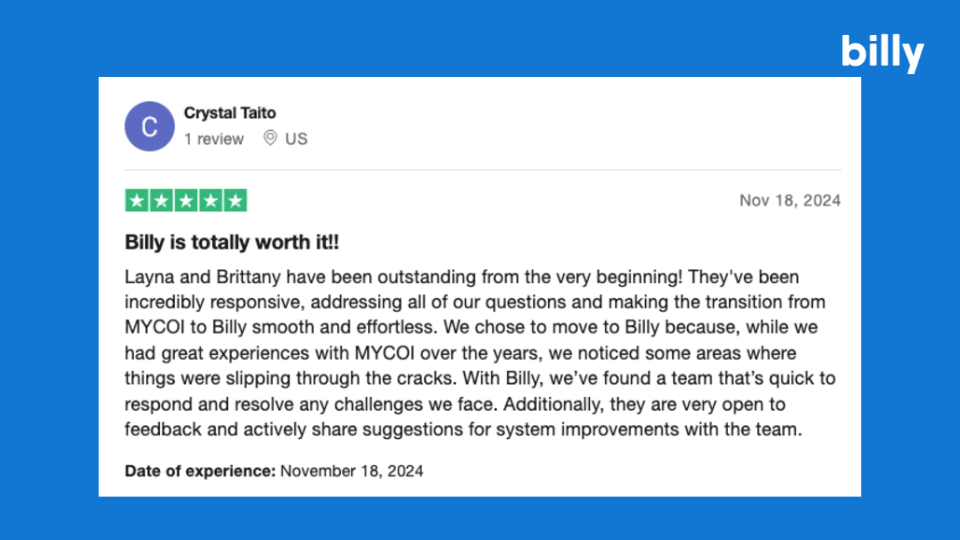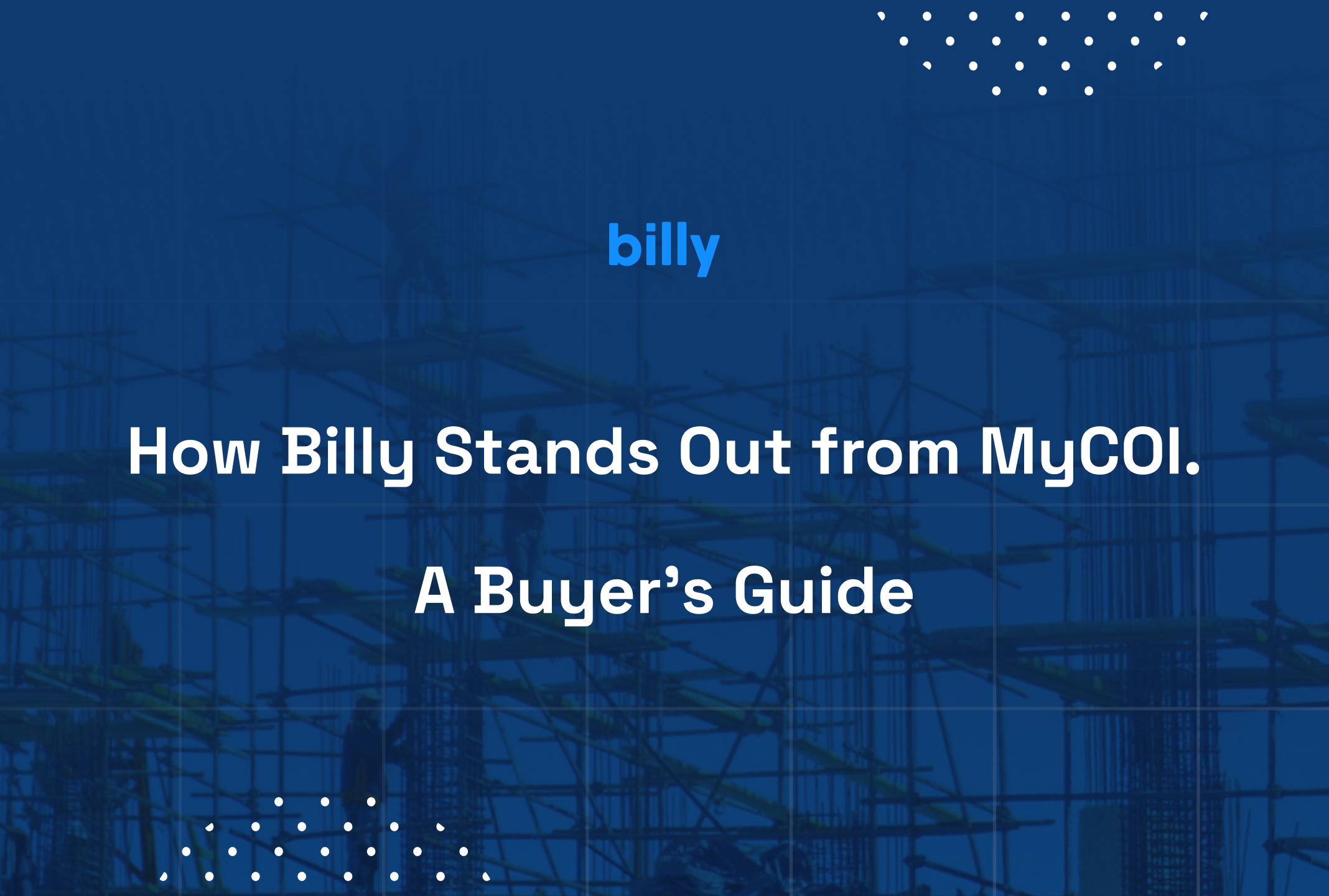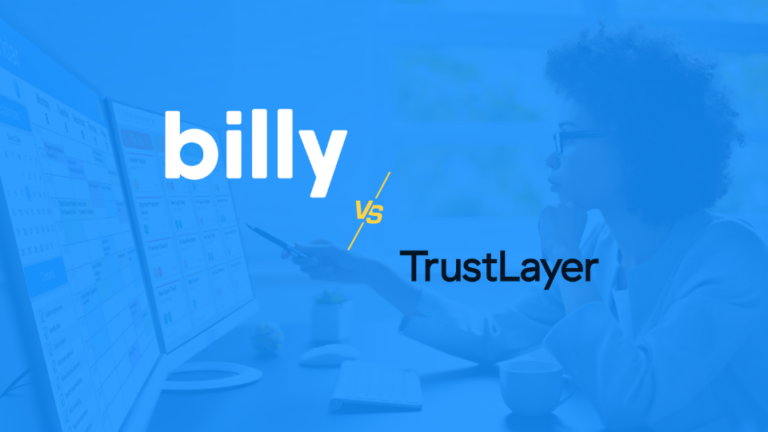For construction professionals tasked with managing Certificates of Insurance (COIs), the stakes are high. Ensuring compliance, minimizing risk transfer, and avoiding project delays all hinge on having the right systems in place to mitigate risk. While platforms like Billy and MyCOI both promise to simplify COI tracking, not all solutions are created equal.
Billy combines fast processing, unparalleled accuracy, and a user-friendly design tailored to the unique demands of the construction industry. But what truly sets Billy apart is the team’s dedication to excellence in customer service, usability, and trusted partnerships.
Billy’s award-winning customer service team acts as an extension of your business, delivering proactive support and expert guidance to keep your compliance management seamless and stress-free. Designed with simplicity in mind, Billy’s intuitive platform also makes managing compliance straightforward, even for complex projects.
Billy is the preferred compliance management solution for industry giants like Travelers, Arch, USI, and Insurance Office of America. These trusted names rely on Billy for its unmatched efficiency and reliability, making it the go-to choice for construction professionals nationwide.
While others may promise, Billy delivers. As the preferred choice among leading insurers and firms, Billy sets the standard for compliance management software.
Why COI Tracking Software Matters
Managing certificates of insurance is a requirement in every construction contract. While the insurance limits may be the same across different projects, certificate holders, additional insureds, and endorsements need to be checked on each contract issued on a project. The right COI tracking software ensures compliance with insurance requirements, minimizes risk, and helps avoid costly delays. However, the wrong platform can complicate processes, waste valuable time, and even impact project timelines.
Document Reviewing Efficiency: Billy vs. MyCOI
While MyCOI offers COI reviews, users frequently report inconsistencies in processing times. Audits with MyCOI can take anywhere from two days to two weeks, leaving businesses vulnerable during critical renewal periods. Additionally, MyCOI’s standard plans do not offer expedited processing, making it difficult to meet tight deadlines.

Billy eliminates these bottlenecks with a robust COI tracking system. Billy’s team of licensed insurance experts ensures audits are completed within 24 business hours, maintaining a 99.9% accuracy rate. Billy’s Managed Services plan also combines CRIS-certified specialists with advanced AI-driven technology, allowing businesses to trust their compliance process while saving valuable time.
Billy’s quick turnaround times and precision-driven audits position it as the top construction software for compliance management, outperforming MyCOI on both speed and reliability.
User Experience: Intuitive Design for Construction Professionals
Usability is one of the most essential factors in evaluating any software. Complex workflows and outdated interfaces can frustrate users and hinder productivity.
MyCOI’s Interface
Many users describe MyCOI’s platform as “similar to using Windows 95” outdated and cumbersome, with a design reminiscent of legacy software. The lack of intuitive navigation can make managing compliance tasks unnecessarily complicated.
Billy’s User-Centric Platform
In contrast, Billy was designed with the end user in mind. The sleek, modern interface ensures that construction teams, insurance brokers and real estate professionals can easily manage COIs without a steep learning curve. Billy’s streamlined workflows allow users to track compliance efficiently, while its visually appealing dashboard enhances overall usability.
Moreover, Billy’s platform consistently receives praise for reliability and technical performance, solving the issues that MyCOI users frequently face.
Seamless Integration with Industry Tools
For construction professionals, software integration can make or break operational efficiency. The ability to connect compliance software with other tools within their existing tech stack ensures a seamless workflow across your organization.
Billy not only simplifies compliance management but also enhances productivity through robust integrations with some of the industry’s leading platforms.
- Procore Integration: Billy offers two-way integration with Procore, enabling streamlined project and vendor data management with real-time updates and synchronization.
- Autodesk Integration: Integrating with Autodesk, Billy helps project managers and compliance officers coordinate project documentation, keeping all essential data centralized and accessible.
- CMiC Integration: Billy connects with CMiC to support comprehensive project financial management, providing greater alignment between compliance tracking and financial oversight.
- DocuSign Integration: The platform integrates with DocuSign for efficient digital document management, simplifying the signing and tracking of critical compliance forms.
- Sage 300, Viewpoint Vista and JD Edwards Integrations: Billy also supports financial data synchronization through its integrations with Sage 300 and JD Edwards, ensuring that compliance information aligns seamlessly with accounting and financial systems.
These integrations make Billy more than just COI tracking software—it’s a comprehensive compliance management solution that keeps your operations running smoothly.
Billy is Tailored to the Construction Industry
While both Billy and MyCOI cater to businesses requiring COI tracking, Billy sets itself apart with a construction-first approach. Its tools, features, and integrations are specifically designed to address the challenges faced by contractors, subcontractors, and real estate professionals.
Industry-Specific Solutions
Billy understands the complex nature of construction projects, where numerous subcontractors, vendors, and insurance requirements converge. Unlike generic COI tracking tools, Billy’s compliance solutions are tailored to construction firms of all sizes, ensuring every contractor or developer—from small firms to large enterprises—receives tools that fit their operations.
Proactive Alerts and Notifications
One of the most significant risks in construction compliance is missed deadlines for COI renewals or expirations. Billy minimizes these risks by providing proactive alerts and notifications, helping businesses stay ahead of compliance deadlines. With these automated reminders, you can focus on managing projects instead of chasing paperwork.
Customizable Workflows
Every construction project is unique, and so are its compliance needs. Billy allows organizations to create custom workflows tailored to their specific requirements. Whether it’s automating vendor onboarding or streamlining the review process for COIs, Billy adapts to your business, not the other way around.
Centralized Compliance Management
Construction projects involve a multitude of moving parts, often scattered across different platforms. Billy simplifies this complexity by offering centralized compliance management. By integrating with key construction tools like Procore, Autodesk, CMiC, and DocuSign, Billy ensures that COI tracking becomes a seamless part of your project management process.
Built for Collaboration
Construction projects thrive on teamwork, and Billy supports this with collaborative features that allow multiple stakeholders—risk managers, project managers, and administrative teams—to access and update compliance data in real-time. This ensures everyone stays aligned and informed.
Minimized Project Delays
Delays in compliance can halt projects and cost thousands of dollars. Billy’s fast COI audit process (within 24 business hours) and accurate tracking eliminate unnecessary downtime, keeping your projects on schedule and within budget.
Billy’s commitment to the construction sector isn’t just about tools; it’s about understanding the industry’s unique pressures and providing solutions that address them. Whether it’s the high volume of COIs, the need for seamless integrations, or the demand for real-time updates, Billy delivers with precision.
Customer Testimonials: Real Feedback That Speaks Volumes
At Billy, customer satisfaction isn’t just a priority—it’s a testament to the platform’s effectiveness. Users consistently highlight Billy’s unparalleled support and ease of use.
Here’s what some of our customers have to say:
- “The Billy team is very responsive and they follow up to make sure everything is going well. They are friendly and always happy to help. I’d highly recommend this system and company for your insurance tracking needs. Make life so much easier!”
- “With Billy handling our COI compliance we’ve reclaimed countless hours each week. Their platform streamlines the entire process, allowing me to focus on what really matters”
- “Their customer service is outstanding and very responsive. They develop features very quickly and they solve real problems that save us lots of headaches, time and make us that much more efficient.”
Billy Is the Top Construction Compliance Software
When evaluating COI tracking software, it’s essential to choose a platform that aligns with your business goals, simplifies compliance, and enhances efficiency.
If you’re ready to streamline your compliance process and minimize risk, Billy’s COI tracking software is the solution you’ve been searching for. Schedule a personalized demo today and start your free trial to see how Billy can transform your compliance management.
Frequently Asked Questions
What is the best COI tracking software for the construction industry?
Designed specifically for builders, Billy offers fast, accurate COI audits, seamless integrations with tools like Procore and Autodesk, and user-friendly workflows that simplify compliance management. With its focus on construction-first solutions, Billy stands out as the most reliable and efficient option.
What integrations does Billy offer?
Billy supports integrations with Procore, Autodesk, CMiC, DocuSign, Sage 300, and JD Edwards. These integrations help streamline project management, financial synchronization, and digital document workflows, making it easier for construction professionals to manage compliance efficiently.
What makes Billy user-friendly for construction teams?
Billy features an intuitive, modern interface designed to reduce complexity. It eliminates manual tasks by automating email reminders, COI uploads, and document audits. Subcontractors can upload certificates via a drag-and-drop email portal, with no logins required.






